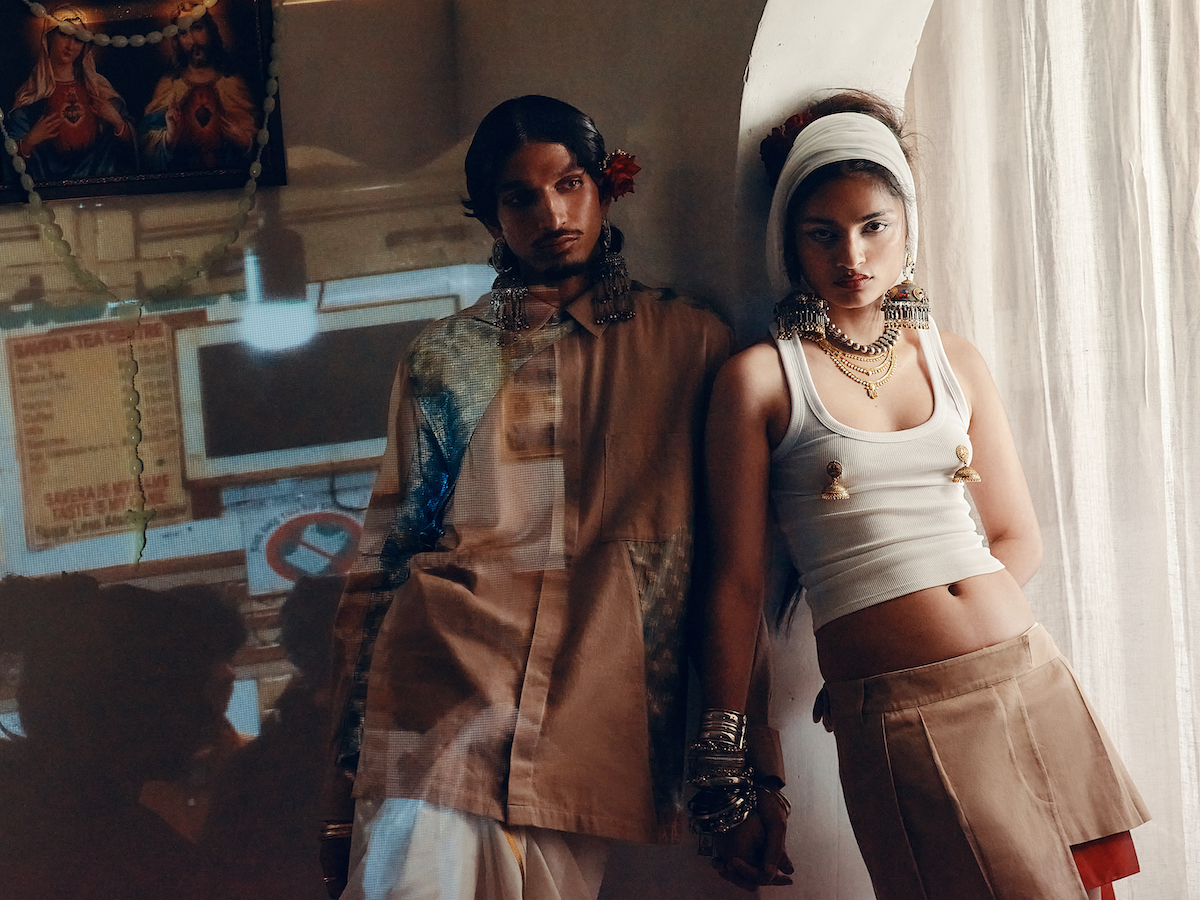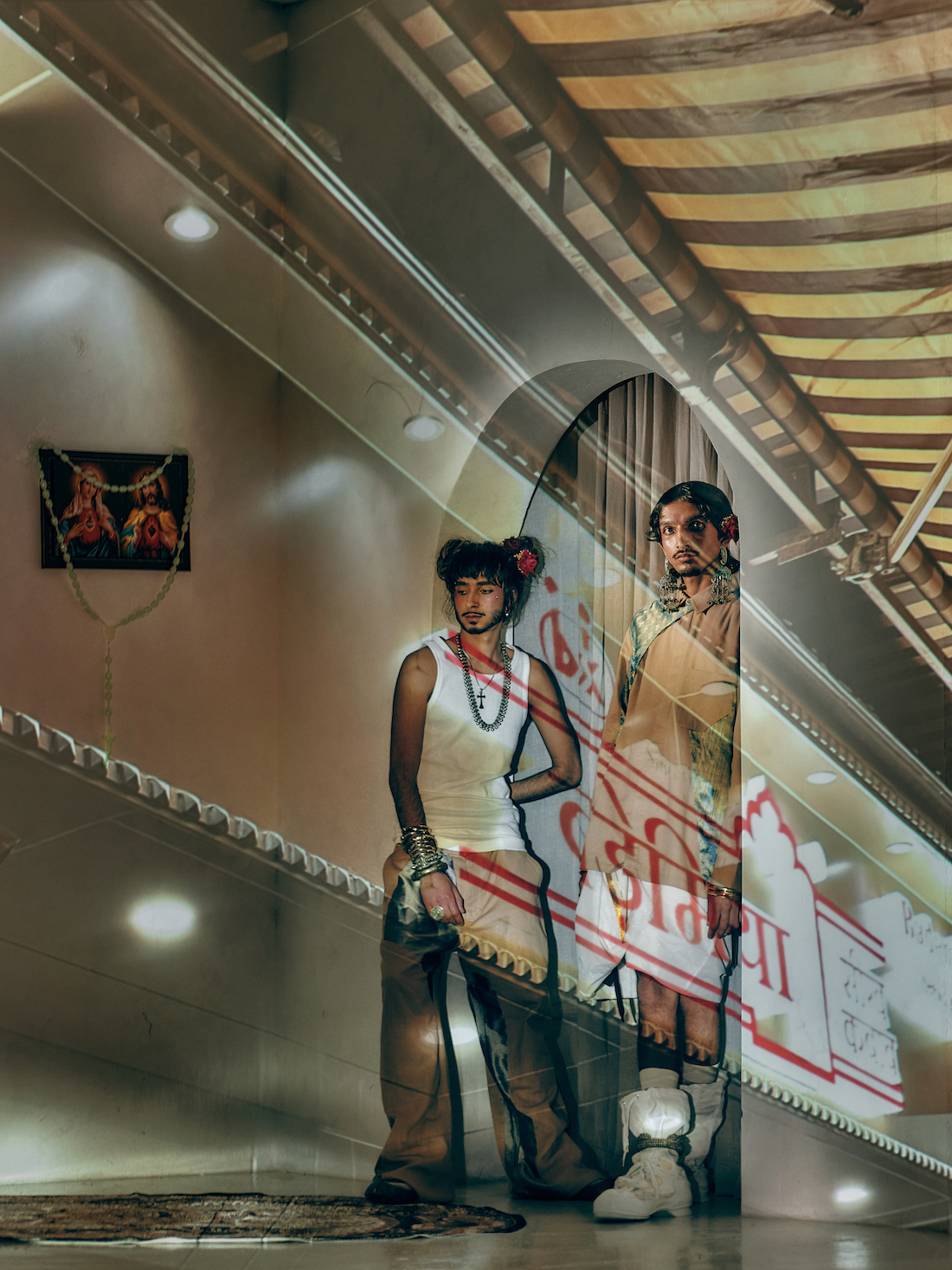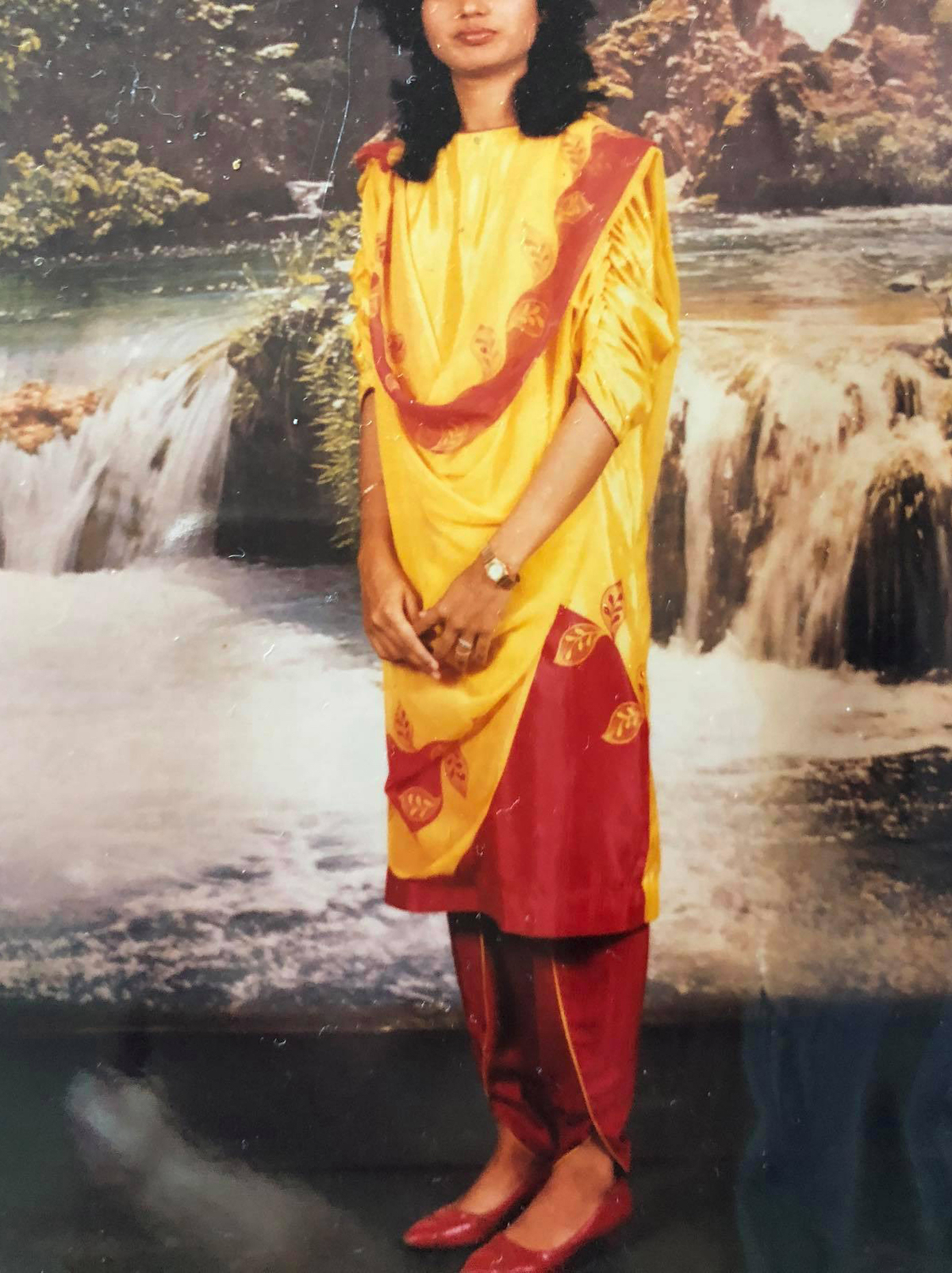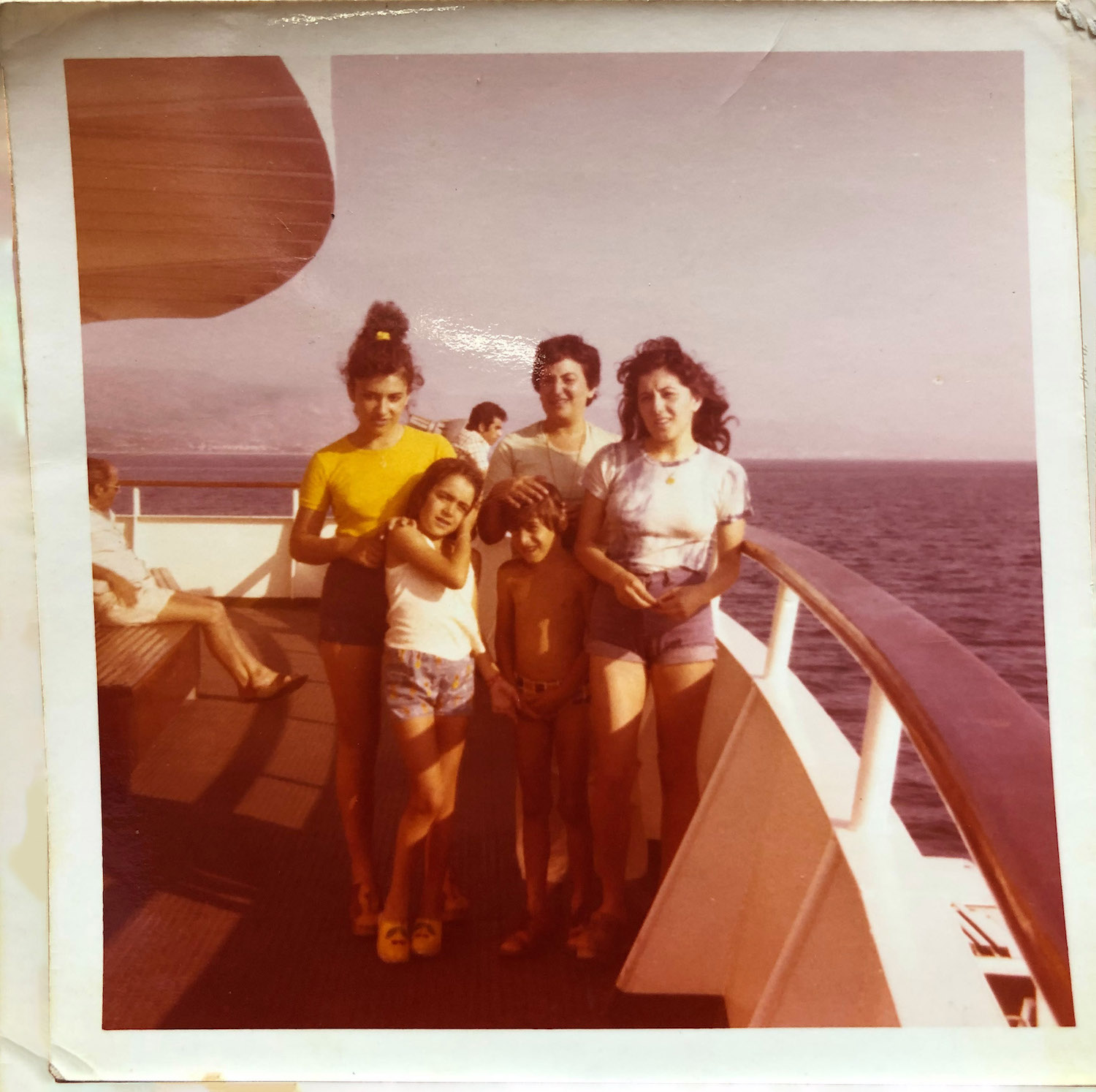
Growing up in a society that is very abrupt to put one’s cultural identity into a homogenous box, the Indian-Italian-German sibling duo have always been aware of the challenges that come with navigating a diverse familial background. As a vessel for this nuanced self-exploration, Marcella and Marco Lobo founded LOBOMAR– – a brand utilising fashion as a universal language that symbolises cultural belongings while constructing an independent identity. This season, LOBOMAR- released their debut collection, Final Orders, Please, that draws upon late-night eateries as a point of cultural convergence and dissolution of barriers. In light of the release, we catch up with the pair to talk about their relationship to the saree, the inspiration behind the editorial, and their journey of reconnection with their roots. We quickly learn that LOBOMAR-‘s ethos extends beyond fashion, and grows into a transdisciplinary platform of individuals interrogating their mixed heritages and interlacing cultures. The conclusion? For Marcella and Marco, identity lies beyond the stereotype-ridden constituent parts of one’s national and ethnic backgrounds, but in the hyphens that bring them all together.
Talk me through the birth of LOBOMAR-! How did the idea of the brand first arise?
Marcella: It was during a work trip, where I visited a lot of factories in India. I had been thinking of starting my own brand already, so I was doing a lot of research outside of my work hours. I got so overwhelmed with and demotivated by seeing all that overproduction and mountains of unsold clothes. Shortly after I got back, I was going through the clothes of my own as I was moving apartments, and I came across this box of sarees that my aunt and grandmother left me from India. I got so inspired by the colours and the fabrics, but I also began thinking about where all those sarees actually go. Many people wear them just once for special occasions, and they’re not as passed down generationally as much, as people generally wear them less. For me, sarees had never felt authentic on my body, so it had just been admiring them from afar. So, I began thinking of how I can reimagine it to feel more like me. And then it transpired into thinking broadly about what makes something your own, culturally and personally. I began talking to Marco about it, who I obviously grew up with.
Marco: I was building this AI company in the UK and had just launched a business in New York when Marcella got back from this really intense trip and began telling me about it. I had already been thinking about creating something more mission-driven and personal to myself. I love technology, but Marcella’s idea really hit home on such a deeper emotional level. So, I thought that beyond just advising for it, I actually wanted to be involved. I spent so much time abroad without my family, so I thought it could be a nice way to reconnect and spend time with my sister. I didn’t know just how much time – maybe a bit more than I bargained for, ha-ha. But seriously, Marcella has always been very creative and inspirational to me, so it felt very right.
It’s so interesting that you say sarees didn’t feel authentic on your body. How has that relationship between your identity and the garment evolved for you?
Marcella: I didn’t have so many occasions in which I could wear a saree. Just looking at the saree, I was always a bit intimidated by it. But through this exploration of finding ways of draping it on myself, it was the first time I felt really connected to it. Before, I only had memories of my grandmother and aunt wearing them. Last year, I wore a saree for the first time in this very culturally traditional way for my cousin’s wedding, which was very special. It’s incredible to have this whole piece of fabric that can be adjusted to my body – and to any body. And seeing how you can also accessorise it to make it your own.
Marco: It was actually our cousin’s first time wearing a saree too – at their own wedding, which is funny.
Ha-ha, I feel like this is such a common occurrence. But it’s also so funny to see how we often cling onto almost symbolical artefacts from a culture we come from, even if we might have been removed from it growing up.
Marco: It also makes it almost more personal – when you don’t grow up in that culture. We grew up in Germany where there isn’t a big Indian diaspora. Our mum is Italian, so she doesn’t wear sarees, but we do have very vivid memories of our grandma wearing them. But it’s also very isolated memories, not a big-picture societal relationship to it.


I suppose it gives you a chance to rebuild that relationship a lot more consciously and intentionally. Is this desire to connect with your roots and understand your identity better something that came to your later in life?
Marcella: It’s definitely shifted. Growing up, it felt like the way we present our culture was always a subject of evaluation. You get a bit more scared of whether you’re presenting it in the right way or not. You get more confident as you grow up, and even during my studies I got to connect to my heritage in a more artistic way, which was very special. Picking what’s relating to you is what makes it feel authentic to you.
Marco: Especially the grey areas where a lot of these things overlap. You often only realise this when you really tune into it and explore your parts of the culture, but also beyond the heritage – it’s about what makes you you. It’s an interesting exercise of connecting the dots.
Tell me more about Final Orders, Please! – it feels like the collection is very much about connecting the dots. What was your creative process and how is this identity exploration manifested in the clothes?
Marcella: The inspiration came from different elements. Firstly, there are grandmother’s and aunt’s sarees, and how they wore them everywhere, from work and to markets. Through my lens, it was the elegance of the everyday that they embraced. Here in Europe, I always thought that getting dressed up was a weekend or a nighttime thing, but looking at them, they were always dressing up. This idea of getting ready no matter the occasion was very inspiring to me. Another element is the food that comes at the end of the night – this has been a big part of our culture. Also, just the ritual of getting everyone together to sit down and enjoy, and how much closer you feel to each other at that time. You lose all formality and pretences fall apart. Visually, to me it was about combining the formality of a uniform broken up with fluid lines of the sarees, as I had an image in my head of policemen and women shedding their uniforms at the end of the day.
Marco: We saw this late-night culture in so many different cities. It existed as much in Germany as in the UK and Italy and India. It goes beyond any geographic boundaries.
I love the idea of late-night rituals as a point of cultural convergence. And how food ties into it as well, seeing that it’s so integral to passing one’s heritage and is a whole love language in itself.
Marco: Every city has these quirky hole-in-the-wall places that everyone knows about. People gravitate towards them at the end of the night. It’s so great to see people eating there super informally while they’re very dressed up.
Marcella: This is where the idea for the shoot came from – using videos from those places as the background. We took those videos in Mumbai in that place that we’d go to our whole life, and even our dad used to go there at the end of nights out when he was younger. Another one was this place in Rome and in Bangalore. The clothes and the styling also play into that. For example, I thought it would be interesting to juxtapose pieces like a mundu, the wrap that men wear casually at home, with a bit more formal wear.
From your aunt’s community to an organisation in Tamil Nadu, the manufacturing process also sounds fascinating. What was the experience like?
Marco: So, there are the sarees we curated and they were upcycled by our aunt’s community. When we knew that sarees were going to be such a big part of the collection, we got it in contact with our aunt. We were really trying to understand what the core issues were, why there are so many beautiful sarees laying around. There is a culture of buying a saree for one occasion, and because of how prominent the pattern is, you usually wouldn’t wear it many times. Our aunt said that her daughter didn’t want them, and a lot of her friends have that issue too. She started messaging her friends and neighbours, and then it spun into this massive WhatsApp group. They collected so many sarees with all these beautiful patterns. A lot of women also shared the stories of how they acquired the sarees and what occasions they wore them for, which was super special. This was really the starting point.
Marcella: For the development of the main fabric, I was really inspired by the Mumbai police uniforms. I’ve seen them so much at the end of the night, or just walking around in general. When we went down to Tamil Nadu, we worked with artisans to produce this cotton fabric. It was very educational to find out how to handweave and how it’s been passed over the generations. The slight ‘imperfections’ that come out of that process are also so special. We then worked with a cutting studio in Mumbai – this is where all the pieces come together. We had a great team who really understood my vision of the placements of the sarees on the parts of the garment. When we received the items, they turned out even better than I imagined.

This sounds like a very special experience. How has the process of connecting back to your heritage impacted you and your self-perception?
Marcella: I really see LOBOMAR- as the bridge between our past and present. It’s been really helping us navigate how to make sense of our identities and the experiences we’ve had growing up and now. We want to break beyond a cultural label imposed on us. One thing that always helped me continuing with the concept was breaking down what a cultural identity and personality is made of. Is it the pieces separately or the hyphen in between that brings them together? For our Indian-Italian-German heritage, we found that it is the hyphen. This is what makes it unique to an individual, as people with the same heritage may have completely different experience and identities.
You’ve also showed your collection at the Wereld museum for the Sari/Statement exhibition. It was so wonderful to see the Indian diaspora come together and celebrate the saree. What was that experience like for you?
Marcella: The first time I saw the exhibition was in London actually. It was really inspiring to see all the Indian designers bringing their own version of the saree. For our installation in Amsterdam, I really enjoyed honouring the saree in its original form in a sense of working with a long fabric as it is. Taking it from the most traditional gender role to a direction the wearer would like it to go to, from experimenting with different ways of draping to combining it with more deconstructed pieces.
I also love the platform for video discussions put forward by your brand. How do you choose creatives to showcase and how does it further LOBOMAR-‘s vision?
Marco: LOBOMAR- started with an urge to make sense of our identity, but we were also super curious how other people who grew up around multiple cultures deal with these questions for themselves. It’s not just about our story – we want to understand how others go through that and to build a community around it. It’s almost like a resource of people you can tap into for everyone to be able to relate to and be inspired by. It began with a lot of conversations off camera. We found them so interesting, that we decided to turn them into a video series. We launched it last year and have had a chance to speak to a really diverse group of artists, chefs, musicians – people from all walks of life around the world. It’s been an amazing way to stay inspired, while keeping within our purpose and going beyond our story.
It’s great to see that you don’t limit your storytelling to one medium or perspective. It really paints a much bigger and authentic picture of what you stand for. Where you headed now?
Marco: We’ve just started the second season of our series with some really exciting creatives, and we’re also conceptualising a new format of bringing those stories together. We’re also starting a series of pop-ups around London and Amsterdam. The plan is also to collaborate with some incredible chefs to bring Final Orders, Please to life, so that people will be able to taste the collection too, ha-ha.
Marcella: It’s been really cool to see how the saree and its aspects have been understood by different people who are buying our clothes. Our South Asian customers really understand and appreciate the cultural history of the saree and the design, while other understand its history from how we tell it and the context we provide. It’s interesting how it speaks to people who are new to the saree, and I’m excited to build up on that in our new collection.
Words by Evita Shrestha
Images courtesy of the brand